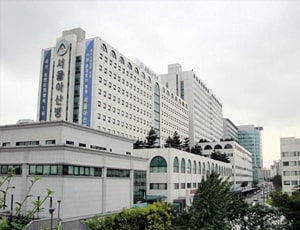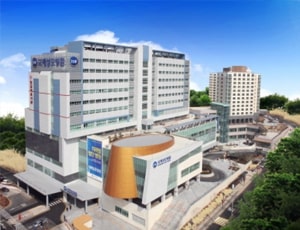The average cost of Prostate Cancer Treatment in Seoul approximately starts from USD 27000
Treatment cost

Asan Medical Centre located in Seoul, South Korea is accredited by ISO. Also listed below are some of the most prominent infrastructural details:


International St. Mary's Hospital located in Seoul, South Korea is accredited by JCI. Also listed below are some of the most prominent infrastructural details:
The prostate is a gland in the male reproductive system, which makes fluid that forms an essential part of the semen. Prostate cancer starts when cells of the prostate glands begin to grow abnormally
Prostate cancer is one of the leading cancers in men above the age of 60. In most of the cases, it is slow growing and may even go undetected and do not cause any problem. However, in some cases, it could be aggressive and cancer cells can spread to other parts of the body (metastatic prostate cancer)
Prostate cancer is a very slow growing disease and starts with tiny alterations in the shape and size of the prostate gland cells. The prostate cancer risk increases with age and it is rarely observed before the age of 40. That is the main reason why many men die of old age, without ever knowing that they had prostate cancer.
There is no direct prostate cancer causes. However, there are some factors that can increase the risk of prostate cancer, including the following:
Usually, prostate cancer means the cancer of prostate gland cells called prostatic intraepithelial neoplasia (PIN). Almost all the prostate cancers are adenocarcinomas, but there are some other types of prostate cancer as well, including the following:
Based on how abnormal the patterns of cancer cells look, prostate cancers are classified as:
There are no warning signs of prostate cancer. The symptoms of metastatic prostate cancer usually appear first in the region that the cancer cells have invaded.
After cancer causes the prostate gland to swell, the following signs of prostate cancer may be experienced:
In prostate cancer stages, the following symptoms may also be there:
Treatment for prostate cancer can be divided into early stage and advanced stage. Your doctor will choose the best suitable treatment for you, depending on the stage and classification of prostate cancer, your age, and overall health status. Although, your feelings, expected lifespan, and your opinion will play a major role in choosing the right kind of treatment.
The most common treatment options for prostate cancer include the following:
Watchful waiting or active surveillance
No immediate treatment is carried out, but the patient is followed up at regular intervals to see the progression of the disease. This method is used in elderly patients with short life expectancy and in case of an early disease.
The main type of prostate surgery is called radical prostatectomy. In this, cancerous tissues are removed by a surgical operation. A long cut in the abdomen is needed in this surgery, depending on the extent and stage of cancer.
However, a keyhole surgery for prostate cancer using a laparoscope or robot is also available. These treatments have good success rates but may result in certain long-term side effects such as sexual dysfunction, narrowing of the urethra, and urinary incontinence.
High-intensity beams are used in this treatment to destroy the cancer cells in the prostate. Radiotherapy can be administered via needles implanted into the prostate, under ultrasound guidance or as an external beam. Radiotherapy can be used after surgery if the resection of cancer tissue has not been completed.
There are two types of radiotherapy for prostate cancer:
In this, the radiation beams are shaped so that the region where they overlap is as close to the same shape as the organ that requires treatment. It minimizes healthy tissue exposure to radiation.
In this, the beams with variable intensity are used. It is an advanced form of conformal radiotherapy. It is usually delivered with the help of a computer-controlled linear accelerator.
Hormone therapy involves the use of medications that suppress testosterone levels. They are used as primary treatment and in advanced cases or Stage 4 prostate cancer.
Chemotherapy is a kind of advance drug treatment in which strong medications are used to kill the cancer cells and prevent it from spreading. It is used when the prostate cancer is not controlled by hormonal treatment. Chemotherapy is selected only for treatment of Stage 4 prostate cancer and when the patient can cope with it.
This treatment uses extremely cold temperatures to freeze and destroy cancer tissues in the prostate. Cryotherapy is the best option for treating recurrent prostate cancer, especially if initial radiation therapy did not kill enough cancer cells. The surgeon inserts an ultra-thin metal probe or needle into the prostate gland, from which a freezing liquid, such as liquid nitrogen or more commonly, argon gas, is infused into the prostate gland.
Some treatments such as radiofrequency and high intensity focused ultrasound (HIFU) are used to treat early prostate cancer or when the patient is not fit for a major surgery.
Ask your healthcare adviser for the best multiple options and choose the one that meets your expectations
On an average, Prostate Cancer Treatment in Seoul costs about $27000. Only some of the best and certified hospitals in Seoul perform Prostate Cancer Treatmentation for international patients.
The cost of Prostate Cancer Treatment in Seoul may differ from one medical facility to the other. Some of the best hospitals for Prostate Cancer Treatment offer a comprehensive package that covers the end-to-end expenses related to investigations and treatment of the patient. The comprehensive Prostate Cancer Treatment package cost includes the cost of investigations, surgery, medicines and consumables. A prolonged hospital stay due to delayed recovery, new diagnosis and complications after surgery may increase the cost of Prostate Cancer Treatment in Seoul.
There are many hospitals that perform Prostate Cancer Treatment in Seoul. The top hospitals for Prostate Cancer Treatment in Seoul include the following:
After Prostate Cancer Treatment in Seoul, the patient is supposed to stay in guest house for another 17 days. This duration of stay is recommended to complete all the necessary follow-ups and control tests to ensure that the surgery was successful.
There are certain expenses additional to the Prostate Cancer Treatment cost that the patient may have to pay for. The per day extra expenses in Seoul per person are about 40 USD.
After the Prostate Cancer Treatment surgery takes place, the average duration of stay at the hospital is about 4 Days. The doctors team review the patient's recovery during this time with the help of blood tests and imaging scans. Once they feel that everything is on track, the patient is discharged.
There are more than 2 Hospitals that offer Prostate Cancer Treatment in Seoul. These hospitals have the required expertise as well as infrastructure available to handly patients who need Prostate Cancer Treatment. Also, these hospitals follow the necessary guidelines as required by the medical associations for the treatment of Prostate Cancer Treatment patients.
Some of the most sought after doctors for Prostate Cancer Treatment in Seoul are:
One of the most popular destinations for medical tourism in the world, Seoul, the capital of South Korea attracts around 60% of the patients traveling to the country for quality care. More than 2.76 million International patients travel to South Korea on average. This can be attributed to high-quality medical services, economical healthcare services, and affordable packages that combine both treatment and relaxation. The number of healthcare organizations in Seoul tally up to 21,507. Out of these, 14 are advanced hospitals that provide a range of healthcare services. The high success rate of cancer treatment, plastic surgery, and organ transplants attract the majority of foreign patients to Seoul. Hundreds and thousands of patients from abroad travel to Seoul for cosmetic and plastic surgery. The largest proportion of medical tourists belonged to China and the United States. The top hospitals in Seoul have well-trained medical staff along with coordinators that help international patients availing treatments without any issues.
Seoul has a wide network of internationally accredited hospitals that are using cutting-edge medical technology to treat patients. Some of the top hospitals in Seoul are:
The doctors in Seoul obtained their medical education and training from some of the most reputed medical institutions around the world. Some of the top doctors in Seoul are:
Seoul is a major healthcare center and is well connected to the major cities in the globe via air. You can reach the city by international flights. If you are planning to travel, then we can assist you in making the journey hassle-free.